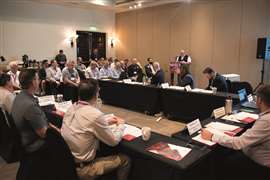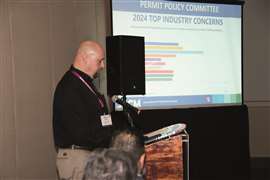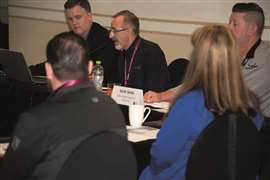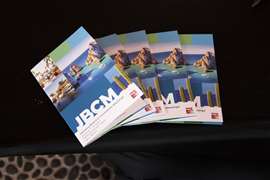SCRA event sparks safety discussions
04 March 2024
SCRA members gather in Mexico to kick off 2024. Mike Chalmers reports.
Members of SCRA from around the world met up in Cabo San Lucas, Mexico, from January 7 to 10 for the annual January Board and Committee Meetings (JBCM). There they set priorities on a wide range of issues that will impact and influence the crane, rigging and specialized transport industries in 2024 and beyond.
 Committee members on both the crane and rigging and transportation sides of SCRA discussed the emerging legalisation of marijuana in the USA and Canada, with an eye towards putting the topic on agendas at SCRA’s Annual Conference in April. (Photo: SCRA)
Committee members on both the crane and rigging and transportation sides of SCRA discussed the emerging legalisation of marijuana in the USA and Canada, with an eye towards putting the topic on agendas at SCRA’s Annual Conference in April. (Photo: SCRA)
The Crane and Rigging Safety Education and Training Committee opened its meeting by examining crane operations in bad weather – with a comprehensive focus on operating protocols during lightning, snow and ice, rain and related visibility events and wind.
Fire suppression systems in tower cranes was also a point of discussion, due to incidents in New York City in 2023.
Boom dollies were also discussed, particularly the Association’s soon-to-be released Boom Dolly Best Practices e-learning module. SCRA senior vice president, crane and rigging, Beth O’Quinn updated the committee by explaining that the task force was recently reseated and plans to work with member company Industrial Training International (ITI) on the development of the module.
 SCRA’s Permit Policy Committee will debut its “Best Practices for Specialized Motor Carriers in Qualifying, Selecting and Utilizing Pilot and Escort Vehicle Operator Services” guide this month at the Specialized Transportation Symposium in Texas, USA, 20 to 22 February. (Photo: SCRA)
SCRA’s Permit Policy Committee will debut its “Best Practices for Specialized Motor Carriers in Qualifying, Selecting and Utilizing Pilot and Escort Vehicle Operator Services” guide this month at the Specialized Transportation Symposium in Texas, USA, 20 to 22 February. (Photo: SCRA)
To that end, the group also discussed the new Outrigger Mat Resource Guide, which the committee was expecting to release by the end of the month.
In addition, O’Quinn reviewed SCRA’s ongoing membership with CISC (the Construction Industry Safety Coalition), which monitors and responds to changes within OSHA (US Occupational Safety and Health Administration) rules. She highlighted how the Association was recently signatory to formal comments submitted to OSHA on several issues, including the use of leading indicators for companies’ safety programmes, clarification of employer representatives during inspections and heat injury and illness prevention. The comments urged OSHA to recognise the impact on small businesses and to develop and-or create tools to be applied across industry regardless of jobsite size and different construction sectors.
With that in mind, OSHA’s regulatory agenda includes a wealth of proposed rule changes in 2024. O’Quinn assured the committee SCRA would be monitoring applicable changes and keep SCRA members aware accordingly.
Also noteworthy, attendees were informed that the American Society of Mechanical Engineers (ASME) is looking to work with crane companies operating electric cranes – noting that such equipment currently isn’t captured under its B30 safety standard. This topic would be of particular interest to European crane manufacturers who sell product in the US, where electric cranes will almost certainly require B30 compliance in the near future.
Shaping performance
Out of the Transportation Group Safety Education and Training Committee came an update on the Permit Policy Committee’s forthcoming pilot car best practices guide – aptly titled Best Practices for Specialized Motor Carriers in Qualifying, Selecting, and Utilizing Pilot/Escort Vehicle Operator Services. Chris Smith, SCRA vice president, transportation, said the guide will be available for members as a free resource, debuting at the Specialized Transportation Symposium in Houston, Texas, USA, 20 to 22 February.
Conversations within the meeting moved towards continued difficulty for the industry to work in the US state of California due to a lack of regulatory uniformity and harmonisation beyond permits that threatens to expand elsewhere. Challenges connected to the California Air Resources Board’s (CARB) expected limitations on emissions were also considered, as well as the classification of independently contracted drivers in California as full-time employees eligible with the same benefits, rights and workers’ compensation, as other employees.
Performing safely
Smith also used parts of the discussion to note that “…because real and perceived concerns regarding poor safety performance by bad carriers leads to bad permit policy for all carriers, we have an obligation to advocate SC&RA members’ exemplary safety performance as a powerful advocacy tool moving forward.”
 SCRA’s Tower Crane Committee described a new workforce development initiative in conjunction with the Specialized Carriers & Rigging Foundation (SCRF) – designed to focus on tower-crane-specific career pathways. (Photo: SCRA)
SCRA’s Tower Crane Committee described a new workforce development initiative in conjunction with the Specialized Carriers & Rigging Foundation (SCRF) – designed to focus on tower-crane-specific career pathways. (Photo: SCRA)
Many members in attendance agreed, and also pointed to challenges co-ordinating with utilities across North America concerning crossings during specialized load movements. Smith added that SCRA is looking at working with utility associations in 2024 to help members achieve more efficient OS/OW moves throughout the USA and Canada.
On the tower crane side, it was brought to the attention of committee and audience members during the Crane & Rigging Group Tower Crane Committee meeting that the buzzword around the globe in tower cranes is “normal.” Association members from New York City did, however, deviate from that thinking – expressing that, due to skyrocketing costs, too much available office space and a lack of planned commercial construction, the “age of the high rise” is over in the Big Apple.
Moving on to new business, the Tower Crane Committee described a new workforce development initiative designed to focus on tower-crane-specific career pathways. They will work with the Specialized Carriers & Rigging Foundation (SCRF) on this effort.
The Committee also informed audience members that the final draft of the new Tower Crane Best Practices Procedures document will be completed by the end of the month.
Looking ahead, the Committee reminded those in attendance that, following a very successful International Tower Cranes event last June in Barcelona, Tower Cranes North America 2024 is set for 11 and 12 June, in Nashville, Tennessee – representing another wonderful chance for international companies to learn more about business opportunities in North America.
Generating awareness
Drug testing was another topic of interest for members at the JBCM – particularly, what has fast been labelled “cannabis confusion.” In the Crane & Rigging Group Labor Committee, multiple discussions evolved around which US states and Canadian provinces have legalised marijuana, employer and employee rights, testing limits, privacy issues, the mental health component and ongoing legal ramifications connected to all of the above. The committee made a point to examine the topic more thoroughly and put it on the agenda for the next meeting at the SCRA Annual Conference in Austin, Texas, USA, 15 to 19 April.
Relatedly, in various meetings throughout the week, mental health awareness was discussed and highlighted as one of SCRA’s key focal points in 2024. Multiple committees examined how to best generate such awareness and what types of communication platforms would be most effective. Hardhat stickers and poker chips that boast a 988 suicide-hotline number (Canada and USA) were very well received among an assortment of strategies that included, but weren’t limited to: implementing mental health into daily safety talks and programmes; creating permanent proactivity steps, versus reactive; more comprehensive and consistent employee training and resources; and the potential building of a network within SC&RA itself.
O’Quinn confirmed during the Crane & Rigging Group Governing Committee meeting that “…whatever is done in this regard will be Association-wide as we continue to grow this initiative.”
 SCRA’s 2024 meeting programme kicked off in Cabo San Lucas, Mexico, early January. (Photo: SCRA)
SCRA’s 2024 meeting programme kicked off in Cabo San Lucas, Mexico, early January. (Photo: SCRA)




